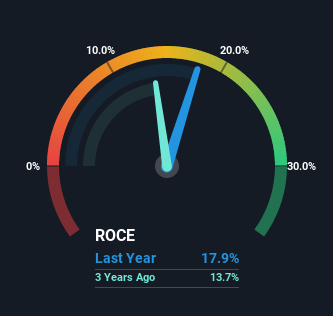- Israel
- /
- Telecom Services and Carriers
- /
- TASE:BEZQ
Bezeq The Israel Telecommunication (TLV:BEZQ) Has Some Way To Go To Become A Multi-Bagger

To find a multi-bagger stock, what are the underlying trends we should look for in a business? Amongst other things, we'll want to see two things; firstly, a growing return on capital employed (ROCE) and secondly, an expansion in the company's amount of capital employed. If you see this, it typically means it's a company with a great business model and plenty of profitable reinvestment opportunities. However, after investigating Bezeq The Israel Telecommunication (TLV:BEZQ), we don't think it's current trends fit the mold of a multi-bagger.
Return On Capital Employed (ROCE): What is it?
For those that aren't sure what ROCE is, it measures the amount of pre-tax profits a company can generate from the capital employed in its business. To calculate this metric for Bezeq The Israel Telecommunication, this is the formula:
Return on Capital Employed = Earnings Before Interest and Tax (EBIT) ÷ (Total Assets - Current Liabilities)
0.18 = ₪1.8b ÷ (₪14b - ₪3.8b) (Based on the trailing twelve months to December 2021).
So, Bezeq The Israel Telecommunication has an ROCE of 18%. On its own, that's a standard return, however it's much better than the 10% generated by the Telecom industry.
Check out our latest analysis for Bezeq The Israel Telecommunication

Above you can see how the current ROCE for Bezeq The Israel Telecommunication compares to its prior returns on capital, but there's only so much you can tell from the past. If you'd like, you can check out the forecasts from the analysts covering Bezeq The Israel Telecommunication here for free.
So How Is Bezeq The Israel Telecommunication's ROCE Trending?
Things have been pretty stable at Bezeq The Israel Telecommunication, with its capital employed and returns on that capital staying somewhat the same for the last five years. This tells us the company isn't reinvesting in itself, so it's plausible that it's past the growth phase. So don't be surprised if Bezeq The Israel Telecommunication doesn't end up being a multi-bagger in a few years time.
What We Can Learn From Bezeq The Israel Telecommunication's ROCE
In summary, Bezeq The Israel Telecommunication isn't compounding its earnings but is generating stable returns on the same amount of capital employed. Additionally, the stock's total return to shareholders over the last five years has been flat, which isn't too surprising. On the whole, we aren't too inspired by the underlying trends and we think there may be better chances of finding a multi-bagger elsewhere.
On a final note, we've found 1 warning sign for Bezeq The Israel Telecommunication that we think you should be aware of.
If you want to search for solid companies with great earnings, check out this free list of companies with good balance sheets and impressive returns on equity.
If you're looking to trade Bezeq The Israel Telecommunication, open an account with the lowest-cost platform trusted by professionals, Interactive Brokers.
With clients in over 200 countries and territories, and access to 160 markets, IBKR lets you trade stocks, options, futures, forex, bonds and funds from a single integrated account.
Enjoy no hidden fees, no account minimums, and FX conversion rates as low as 0.03%, far better than what most brokers offer.
Sponsored ContentValuation is complex, but we're here to simplify it.
Discover if Bezeq The Israel Telecommunication might be undervalued or overvalued with our detailed analysis, featuring fair value estimates, potential risks, dividends, insider trades, and its financial condition.
Access Free AnalysisHave feedback on this article? Concerned about the content? Get in touch with us directly. Alternatively, email editorial-team (at) simplywallst.com.
This article by Simply Wall St is general in nature. We provide commentary based on historical data and analyst forecasts only using an unbiased methodology and our articles are not intended to be financial advice. It does not constitute a recommendation to buy or sell any stock, and does not take account of your objectives, or your financial situation. We aim to bring you long-term focused analysis driven by fundamental data. Note that our analysis may not factor in the latest price-sensitive company announcements or qualitative material. Simply Wall St has no position in any stocks mentioned.
About TASE:BEZQ
Bezeq The Israel Telecommunication
Provides communications services to business and private customers in Israel.
Good value with adequate balance sheet.


